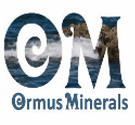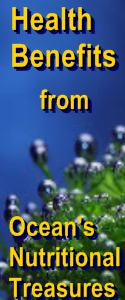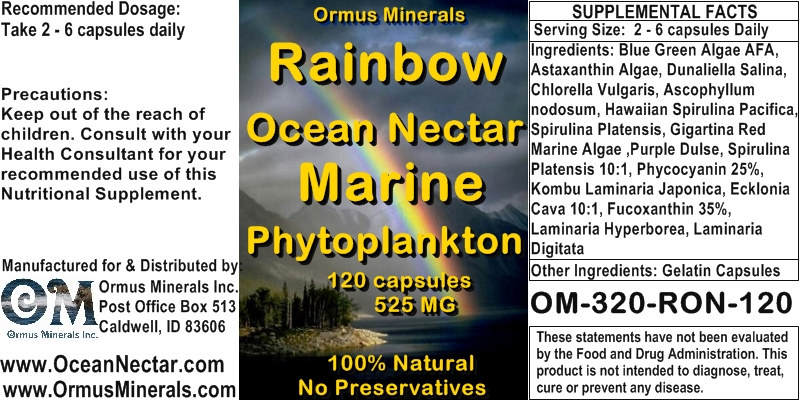OceanNectar.com
|
Ocean Nutrition FAQ
Frequently Asked Questions Q: Why haven't I ever heard of Marine Phytoplankton before? A: Although scientists have been studying the nutritional content of it for many years now, the problem has always been how do you harvest one of nature's most complete foods without adversely harming the eco-system? In addition to that, it is a single-cell plant and each cell is invisible to the naked eye, so it is not very easy to locate them. Harvesting them is only viable where there are large numbers of these plants all growing together in one place still you would need to drain many millions of tons of seawater to harvest sufficient for human needs. This would have the undesirable effect of depleting a valuable resource that all of our marine live so heavily depends upon. The long-term consequences for our planet could well be catastrophic. Q: So how do you overcome this problem? A: It was an extraordinary piece of good fortune (or divine intervention?) that enabled the world to finally gain access to one of Nature's most elusive food sources. In 2004, a shell-fish farmer developed a method of growing Marine Phytoplankton in land based seawater tanks so he could feed the shell-fish he was cultivating for export. The farmer had experimented with many different species of Phytoplankton before perfecting his formula. It was the rapid increase in the quality and growth rate of his shell-fish (including clams, mussels and oysters), that convinced him that he was on to something, although at that stage no one had produced any real evidence that Marine Phytoplankton could benefit human health. It wasn't until the farmer was diagnosed with a very rare and incurable cancer (Mesothelioma) that he instinctively stuck his fingers into one of the tanks of Phytoplankton and put a small amount of the green paste in his mouth and to eat. The reasoning behind this was that if the algae was good enough for his shell-fish it might just do him some good as well! He continued eating the algae every day for around two weeks, and then he noticed the pain in his body was subsiding. Surgeons later conducted a biopsy prior to performing a life-threatening operation, and were amazed to discover that the cancerous tumors in his lungs were now benign. Q: What about algae like Spirulina and Chlorella, are they similar to Marine Phytoplankton? A: Spirulina and Chlorella do have certain similarities, but they have a different nutritional profile, and normally grow in fresh water rather than sea water. On the other hand, Marine Phytoplankton consists of hundreds of different varieties of single cell micro-algae, and it appears that Phytoplankton is far more easily absorbed by the cells of the body where the nutrients can be of the most benefit. It is interesting to note that over 100,000 of these tine single-celled organisms will fit inside just one drop of water. Q: How do I know that Marine Phytoplankton is safe to eat? A: Sample batches of Marine Phytoplankton are regularly tested in a laboratory to ensure that there are no harmful contaminants present, unlike much of the produce that is sold in grocery stores and supermarkets. Q: I am on medication, should I talk to my Doctor before taking this product? A: Yes. Although Marine Phytoplankton is a whole food (no additives, colorings or preservatives) it is always recommended that you discuss any changes to your normal diet with your health care professional first. It may be that you can start to reduce your level of medication, but that should be a decision for your Doctor. Q: If Marine Phytoplankton can help someone with a particular medical condition that I also suffer from, can I expect similar results? A: It is important to stress that Marine Phytoplankton is a highly nutritious food; therefore it cannot directly treat or cure any illness or disease. What it can do is feed the cells of the body with a quite remarkable combination of vitamins, minerals and other essential nutrients. It is then possible for the body to function much more effectively in the vital task of cell growth and regeneration. You should also be aware that what works for one person may not necessarily work exactly the same for another. However, medical opinion is now moving towards the idea that 'complete food' (that is diet containing everything the cells in our body need to stay healthy), is the best way to help fight disease and illness. Q: Marine Phytoplankton contains some elements I've never heard of before, are they compatible with our own body chemistry? A: To find out what your own body is made of, please read about the Body Mineral Elements. Will Phytoplankton interact with any medications? Marine Phytoplankton is a whole food supplement. It is rich in vitamins, minerals, carotenoids, protein, and essential fats. Since it is a green plant food, it is known to be a source of vitamin K which may theoretically affect the therapeutic properties of blood thinners. If taking blood thinners, use under the guidance of your health care professional. Why is Marine Phytoplankton so expensive? Growing Phytoplankton is a highly specialized and a very complex process. A football field's worth of land is required to produce 70 kg in a period of 2-3 months under 24 hour monitoring with state of the art computers and highly trained professionals. Nevertheless, those who supplement with our Marine Phytoplankton find that the value of the nutritional benefits far outweighs the price. Why select Marine Phytoplankton over other algae’s such as chlorella and spirulina? Marine Phytoplankton is the origin of all plankton. It has pigments that are unique to marine phytoplankton which no other plant material has. It is these pigments that scientists are looking at to find out why they are so beneficial to health. Also, spirulina and chlorella grow in fresh water. Phytoplankton, on the other hand, grows in the ocean and therefore contains an array of minerals and other nutritional elements not found in fresh water algae. Is Marine Phytoplankton linked with any food allergy, intolerance or sensitivity issues? No allergic reactions using Marine Phytoplankton have ever been reported, it is considered a safe whole food. Here's an interesting fact related to that: "Only seven foods comprise 95 percent of all food allergies, they are: milk, soy, fish, wheat (gluten), eggs, peanuts, and tree nuts." (The Yale Guide to Children's Nutrition, page 186, 1997.) [02.11.25.01 What is Marine Phytoplankton? Marine phytoplankton is comprised of countless tiny plant-like cells called "micro-algae", which naturally transform sunlight, raw inorganic minerals and carbon dioxide to become the world's super-food. About the size of red blood cells, they form the foundation of the food chain for all other multi-cellular marine creatures - from sponges to whales. Phytoplankton is nature's perfect and complete food, packed with nourishment that can not only sustain all life but also add phenomenal nutritional benefits, unmatched by other foods. Marine phytoplankton contributes over 70% of the planet's oxygen production while providing a complete source of nutrition: proteins, vitamins, antioxidants, minerals, trace minerals, pigments, enzymes, chlorophyll, essential fatty acids, omega-3 oils and more. When consumed, these microscopic cells are instantly digested and their nutritional goodness rapidly incorporated into cells, tissues and organs – including vital nutrients like vitamins B12, C and E, magnesium, chlorophyll and potassium to name a few. Not only does phytoplankton have all the vitamins, minerals, essential fatty acids, antioxidants and amino acids required for good health, it is so nutrient dense that only small amounts are required to deliver significant nutritional benefits. And since it contains all the minerals found in human blood - in nearly identical concentrations - it offers us a source of minerals far superior to that of any other foodstuff! How Do Marine Phytoplankton Act as Detoxification Agents? Phytoplankton has an alkaline pH, which when consumed help counter the acidity of diets high in refined sugars and red meat. The high density of nutrients found in algae is also a key factor, as many of these sustain cell metabolism and the integrity of human cell membranes as cells detoxify and renew themselves. It is theorized that causes of diseases can be equated to a few specific mechanisms, all of which center on cell membrane function and structure, for example, the damage inflicted by inflammation, oxidation, toxicosis, and mitochondrial dysfunction. Micro-algae contain high levels of antioxidants and anti-inflammatory nutrients to protect membranes, fuel metabolism and aid detoxification processes. What is Marine Phytoplankton ? Marine Phytoplankton is an amazing product with over 200 types of diverse chlorophyll-rich plankton nutrients providing maximum health benefits. It is simply the best tasting and best source of marine phytoplankton ever produced. This revolutionary product is comprised of naturally occurring salt-water algae cultivated in commercial quantities once thought impossible, with no effect on the ocean's abundance. Using an organic process, the phytoplankton is cultured to appoint where all nutrients are extracted in a form uniquely available to the human body. This pure, concentrated product - Marine Phytoplankton- makes it possible for your body to easily absorb and metabolize all the precious nutrients it requires. What is the Science Behind Marine Phytoplankton? Phytoplankton is the ultimate source of food for all multi-cellular life in the ocean, including some of the world's largest and longest living animals. It is the 'vegetation' of the ocean. Phytoplankton also produces up to 70% of Earth's oxygen. Phytoplankton, or marine micro-algae, comprises hundreds of species of photosynthetic, unicellular organisms belonging to the Kingdom Protista. Is Marine Phytoplankton Linked with Food Allergies, Intolerances or Sensitivities? No allergic reactions have ever been linked to the consumption of marine phytoplankton. It is a safe, complete food. Although phytoplankton has detoxifying effects, taking too much, too soon, can produce nausea and/or increased bowel movements. If so, simply decrease your daily intake for a few days until your body adjusts. Does Phytoplankton Interact with Medication? Marine Phytoplankton is a complete food supplement, rich in vitamins, minerals, carotenoids, protein and essential fats. Green plants and phytoplankton are sources of vitamin K, a substance that can affect the therapeutic properties of blood thinners. If you are taking blood thinners, only use this product under the guidance of your health care professional. How do you take Marine Phytoplankton Ocean Nectar? What is the Recommended Dose? The amount of Marine Phytoplankton you take should be tailored to your individual nutritional needs. We suggest 4-6 capsules per day for routine health maintenance, while 8-10 capsules daily may be taken to alleviate chronic conditions like psoriasis and diabetes. Dosages of up to 10 capsules per day may be consumed and tolerated in association with serious afflictions such as cancer. What is the history of Marine Phytoplankton for human consumption?Although phytoplankton for human consumption is a relatively new discovery it is well known as a primary food source for fish and other sea life. It influences the levels of vitamins, minerals, and essential fats, with reference to the healthy omega 3 fats, present in fish. It is highly recommended by leading health authorities that humans consume fish at least 2-3 times weekly for health protection. Many of the reported health benefits associated with phytoplankton may partly be attributed to its provision of vitamins, minerals, and the healthy omega 3 fats.
| |||||||||||||||||||||||||||||||||||||||||
Ocean Nectar Home Ocean Nectar Store Ormus Minerals Marine Phytoplankton Ocean Nectar Ormus Minerals - Ormus Gold Ocean Nectar Ormus Minerals - Energized Ocean Nectar Pure Marine Phytoplankton What Doctors say about Ocean Nutrition Ocean Nutrition FAQ Astaxanthin Benefits Spirulina Pacifica Benefits Spirulina Platnesis Benefits Dunaliella Salina benefits Red Marine Algae Gigartina Benefits Organic Chlorella Benefits Blue Green Algae (AFA) Benefits Kelp Benefits Marine Phytoplankton benefits Contact Us Returns Privacy



